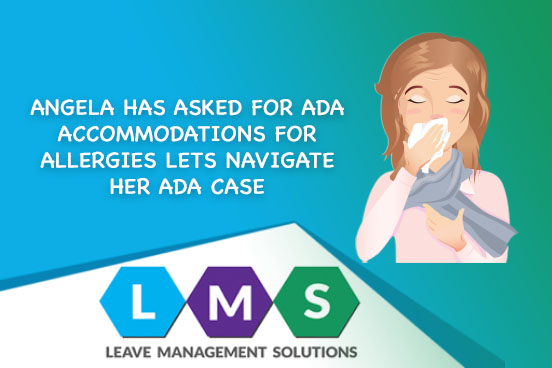The problem:
We are going to use an employee named Angela as an example…Angela has asked for an ADA Accommodation for her Allergies.
Angela has reported she has allergies to everything, especially perfumes, scents and fragrances.
Her workgroup is very accommodating, but a new hire (who agreed at hire not to wear fragrances) triggers Angela’s allergies with the hair products she wears (at least Angela believes that is what it is).
Angela currently has her own office with an air filtration system. What else is the employer required to do to protect Angela from office allergens?
The Solution:
Over the years HR has started to get some clarification regarding how employers should address employees with severe allergies in the workplace. Since the employee has already generously implemented a fragrance free workplace, provided Angela a well ventilated office, and obtained agreement regarding a fragrance free workplace policy from the new employee, it sounds like it is time to clarify for Angela how formally inform the employer about any concerns regarding the effectiveness of the accommodation and specifically how to request assistance from HR if she is impacted by a fragrance in the workplace, whatever the source (co-worker, customer, vendor, etc.).Depending on the type of organization and work environment, it not always possible to eliminate ALL potential allergens and this requested accommodation could be considered unreasonable and an Undue Hardship. However, it is important to implement a clear and objective process when conducting the Reasonable Accommodation Interactive Meetings and completing the Undue Hardship analysis. Talk to Angela, implement a formal Good Faith Interactive Meeting to discuss her current concerns and clarify your expectations regarding how she should communicate with HR regarding exposures to fragrances that she may experience.
These are tricky issues that require very well developed, consistent, and specifically documented Good Faith Interactive Meetings, keeping good notes, as well as solid Reasonable Accommodation and Undue Hardship Analysis implementation procedures. Of course having HR discuss the current concern and the fragrance free policy in more detail with the new employee may easily resolve the exposure issue. However other considerations could include allowing Angela to work from her office, without engaging the co-worker who is impacting her due to their fragrance directly. This could be accomplished by facilitating communications between Angela and the coworker by telephone, email or even Skype, rather than speaking with her face-to-face. Another potential accommodation could consider relocating the new employee to a section of the workspace that is removed from where Angela’s office is located, if this does not impact the operations of the organization. Creativity and consideration are often the key with these types of accommodations.
What is important is that there is a formal Interactive Process Meeting conducted that facilitates an opportunity for HR and Angela to work through Angela’s concerns, determine the impact the issue is having on Angela’s ability to perform the functions of her job, find out from Angela exactly what she is requesting be done (employers are not required to accommodate a 100% fragrance free workplace - however we are still obligated to engage in the Interactive Process to determine what could be a reasonable accommodation), determine if Angela’s request is unreasonable, and help Angela identifying alternative strategies/accommodations that would allow her to perform the essential functions of the job with or without accommodation.


